"Remember those monster stories you heard as a kid?"
When I first heard about The Interactive Adventures of Dog Mendonça & Pizzaboy, its crowdfunding campaign was already two thirds over and looking like it would have trouble reaching its target. Knowing that it would help OKAM Studio further development of the F/OSS Godot Engine, I hopped onboard, figuring that the game itself would be a bonus and a nice diversion if/when it was released.
Looking back, I find myself doubly glad that I supported this project in spite of the bittersweet ending the journey has had.

I'd not heard of the franchise before, but I assumed that since it was published by Dark Horse, it was probably some successful thing that I just hadn't crossed paths with. Since my motivations were primarily about supporting the engine's development, I didn't pay attention to the backer updates. When my backer rewards which included copies of the first two Dog Mendonça & Pizzaboy graphic novels arrived earlier this year, I had the opportunity and motivation to become more familiar with Dog Mendonça, Pizzaboy and their creators.
In the early 2000s, armed with little more than a concept and some passion, Filipe Melo broke into the rather limited Portuguese independent film scene with his first (and only) short film I'll See You In My Dreams, which is apparently considered to be the first zombie film of Portuguese origin. Inspired by the film's positive reception and by the creative spirit of other independent filmmakers around the world (something similar to what we see among some independent game developers), Filipe moved on to work on a larger scale project - a script for a film that would be a tribute to the 80s action and horror films that cultivated his love of cinema.
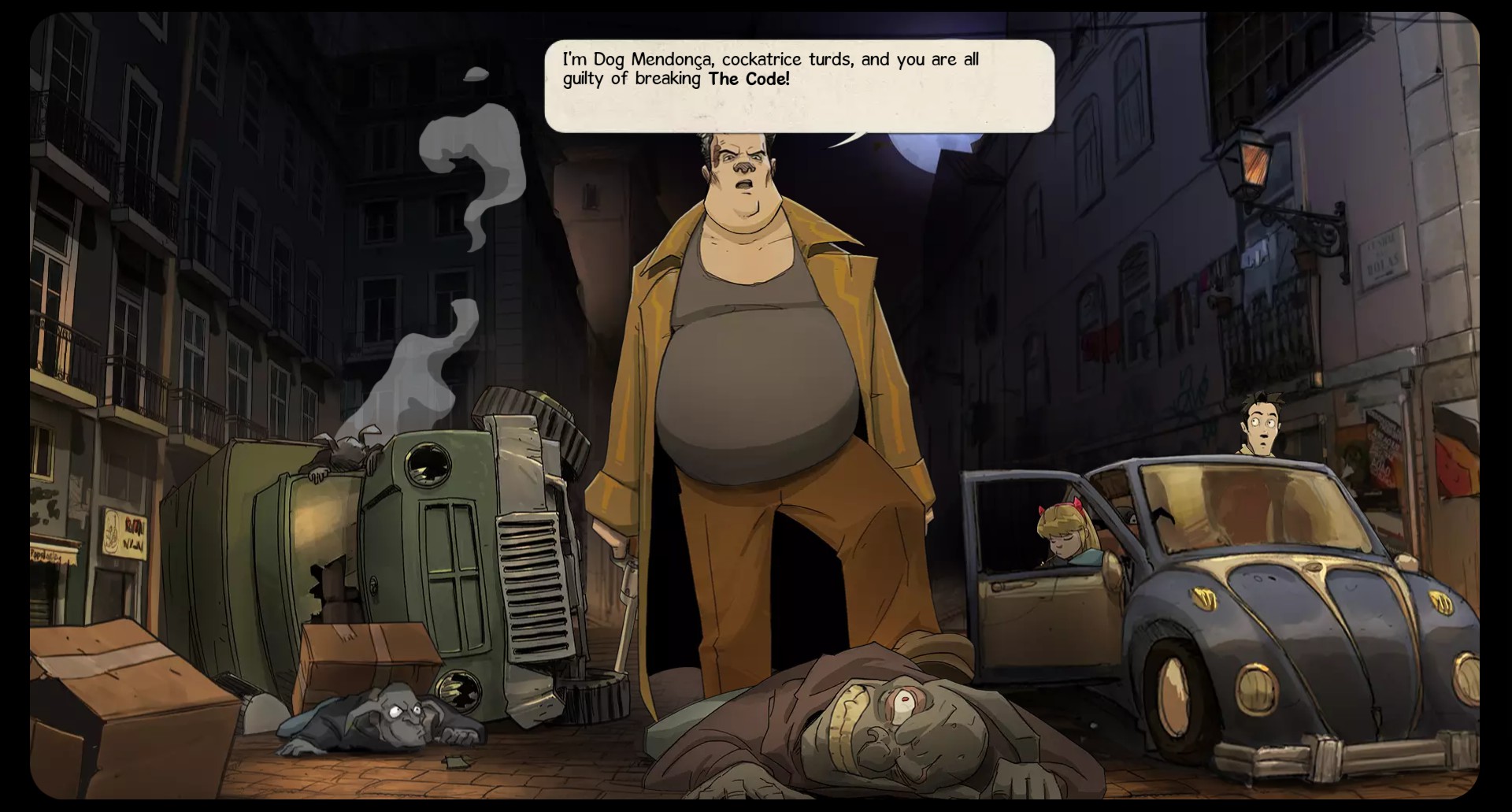
Written in collaboration with Argentinian filmmaker Pablo Parés, this new script took the form of a comedy action horror film that told the story of a disillusioned pizza deliverer who discovers a hidden world of occult monsters after his delivery scooter is stolen by a gargoyle, and becomes caught up in the adventures of a hulking freelance investigator who is responsible for maintaining the Code, a mysterious agreement that protects human society from the monsters and vice versa.
Filipe spent many years of trying to find the right resources and partners to allow such a spectacle The Incredible Adventures of Dog Mendonça & Pizzaboy to be created without compromising the artistic vision behind it, until his girlfriend and producer Paula Diogo suggested that a comic format could be the perfect vehicle for conveying the story without having to be limited by special effects budgets or to relinquish creative freedom to a large studio in order to get it made.
Excited by this idea, Filipe contacted Argentinian art director Juan Cavia, who had been involved with early pre-production efforts, who in spite of advice from friends was happy to return to the project, fulfilling his childhood dreams of working on a comic. After much searching, Santiago Villa was brought on as a colourist to compliment Juan's drawings.
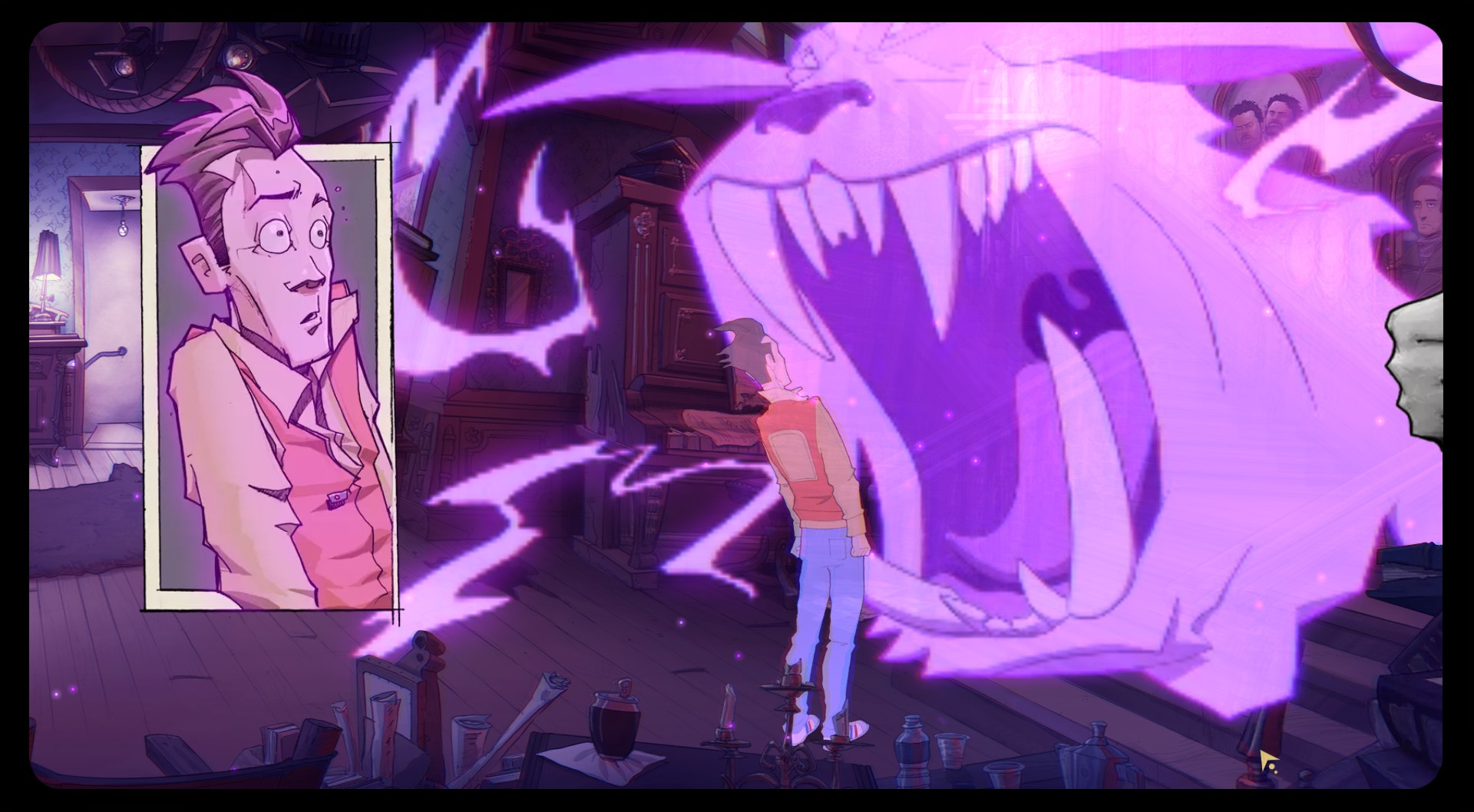
With the help of several other collaborators, The Incredible Adventures of Dog Mendonça & Pizza Boy was published in 2010 through Tinta-de-China, a small publisher based in Lisbon - the same city in which the comic is set. In 2008, Filipe had the opportunity to meet film director John Landis, whose film An American Werewolf in London had been an inspiration Dog Mendonça & Pizza Boy, and invited him to write a forward for the then-incomplete graphic novel. John was impressed by what he saw and passed it on to Mike Richardson at Dark Horse, who would publish an English version in 2011. The comic was met with enough success to spawn a sequel, and a third graphic novel was crowdfunded in late 2013.
Santiago had gone on to co-founded Buenos Aires based game developer OKAM Studio in 2010, and Dog Mendonça & Pizzaboy had apparently had the kind of presence that Sam & Max had at LucasArts before Sam & Max Hit The Road was made, appearing in an internal demo that was used for training and as a testbed for engine development. OKAM had attempted to pitch the game to publishers and investors for years without success, until deciding in 2014 to try crowdfunding as a last resort. After a touch-and-go campaign which was perhaps saved by the public release of the internal demo in the final days, the studio had the funding it needed to make the project financially possible, but not enough to secure the company's future.
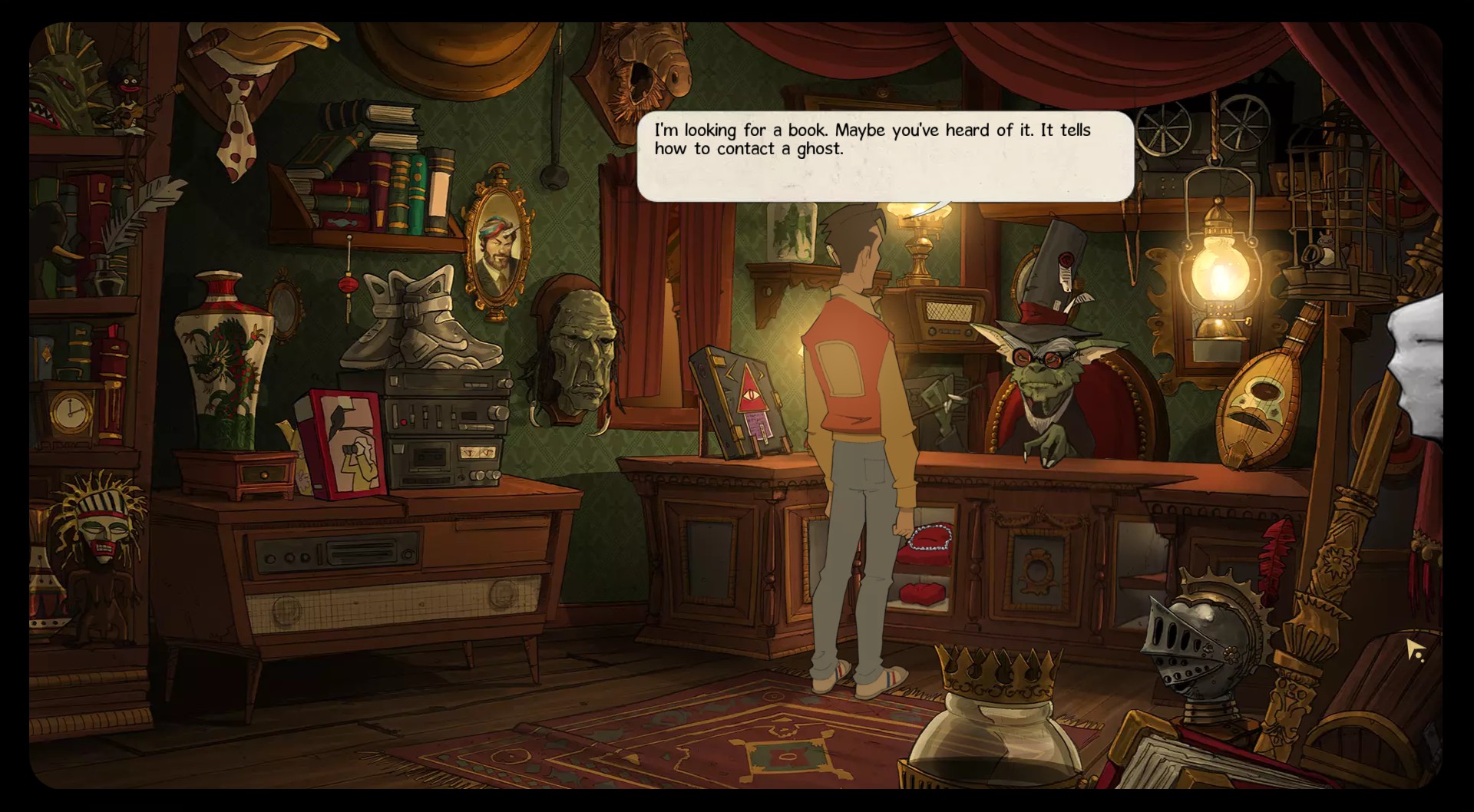
Considering all of this, I'm struck by how themes of independence, creative drive and perseverance resonate across the franchise's history. While Dog Mendonça & Pizzaboy have found varying degrees of success, it has been hard earned through passion and dedication, sometimes flying in the face of what might seem commercially sensible, and often not without risk.
While OKAM Studio's doors may be closing, it is survived by a legacy that I imagine most would be proud to have. I hope that the entire team is proud of their work, and that whatever paths the future will lead everyone along, that The Interactive Adventures of Dog Mendonça & Pizzaboy is a project they can look back on with fondness and pride.
Interactive Adventures
In the "making of" segment included at the end of the first graphic novel is a mention that The Secret of Monkey Island and Day of the Tentacle provided Filipe with inspiration for some of the humour seen in the graphic novels. These influences are also present within the game on multiple levels, ranging from superficial similarities to Curse of Monkey Island's cartoon aesthetic to more deeper approaches to puzzle design and pacing that feel in line with sensibilities found in early LucasArts adventures.
The game opens with Eurico (Pizzaboy) and Dog tied up, hanging above a vat of boiling wax during the final act of the adventure, giving some context for the relationship between the two core character while also setting the tone and stakes before skipping backward in time to allow players to control the events that lead up to that predicament.
A fishy new case leads Dog to be captured and Eurico is left to investigate both Dog Mendonça's disappearance and the case on his own with the dubious assistance of Dog's associate Pazuul, a demon trapped in a young girl's body, and the head of a gargoyle named Edgar.
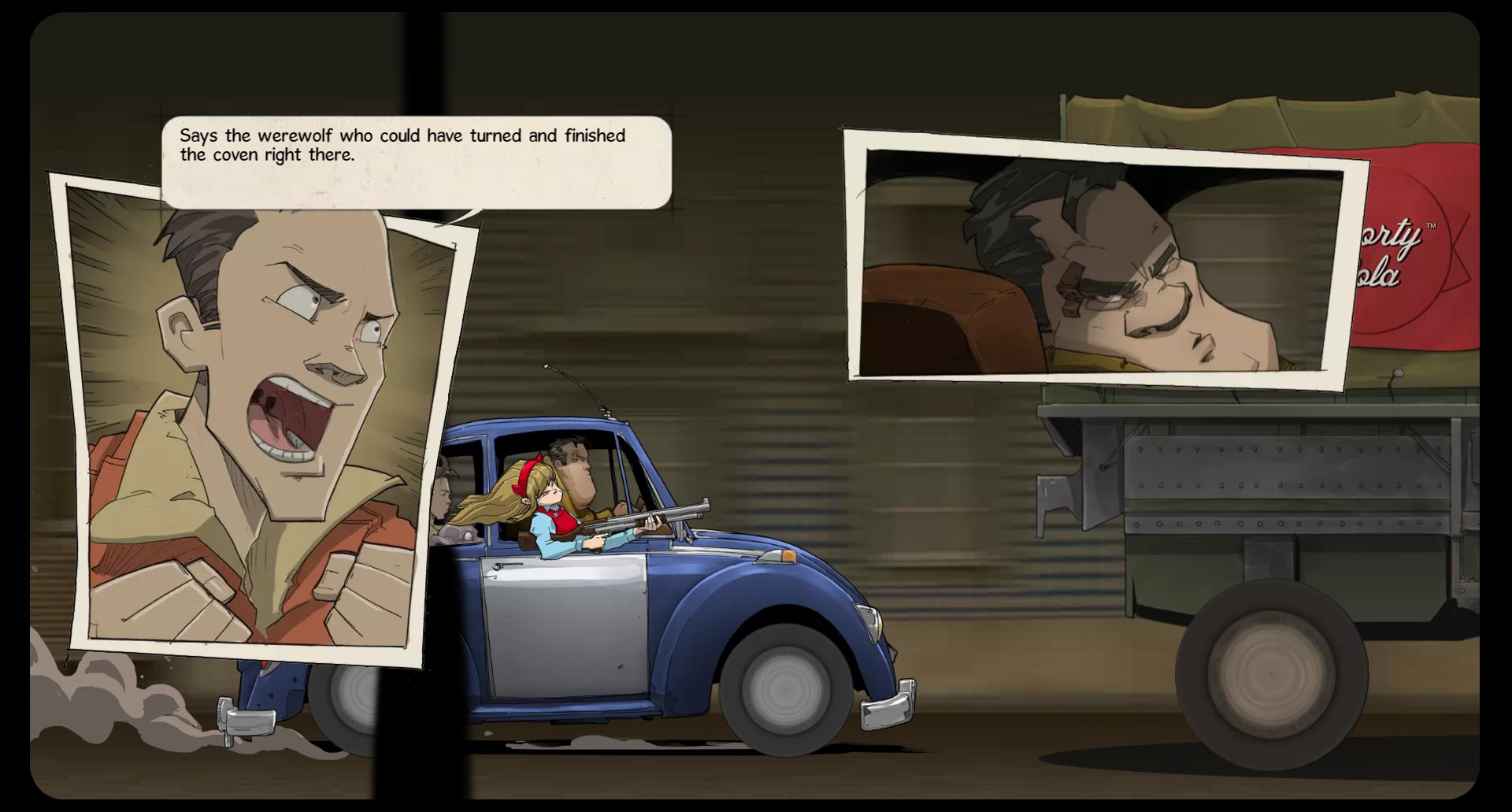
Structurally, The Interactive Adventures of Dog Mendonça & Pizzaboy provides narrative linearity by gating non-linear puzzle chains. Early on in the game, Eurico is tasked with performing a particular rite that requires a certain set of ingredients and tools that the player is free to acquire in any order, but are all required for the story to progress further. As is common with adventure games, the broad strokes of the plot are provided by high level objectives, but the moment-to-moment storytelling emerges in response to the player's actions and attitudes expressed through their dialogue choices and approaches to problem solving.
I found myself enjoying the game's pacing and approaches towards unveiling mystery. Dog Mendonça & Pizzaboy manages to maintain the air of being a fun romp, while making sure that the player's awareness of the overarching plot just beyond reach in a way that keeps things compelling. Though it isn't a long game by the genre's standards (my first playthrough took around 6 hours and I was taking my time), it feels like it comes in at a good length for the story it's telling.
The presentation of the occult world rarely feels gratuitous or pantomime, but I can't help but feel that the game could have benefited from exploring the boundaries between it and the human world a little more. I felt like I was relying more on familiarity with these core concepts of the franchise's universe gained from the novels than from what was exposed within the game itself. I feel that it might be easy for newcomers to assume that the world of Dog Mendonça & Pizzaboy doesn't also encompass the normal everyday human world we know from our own lives. I'm not certain that this would necessarily detract from the game, but to me, it feels like a core aspect of the franchise that gives some extra context to the events of the game.
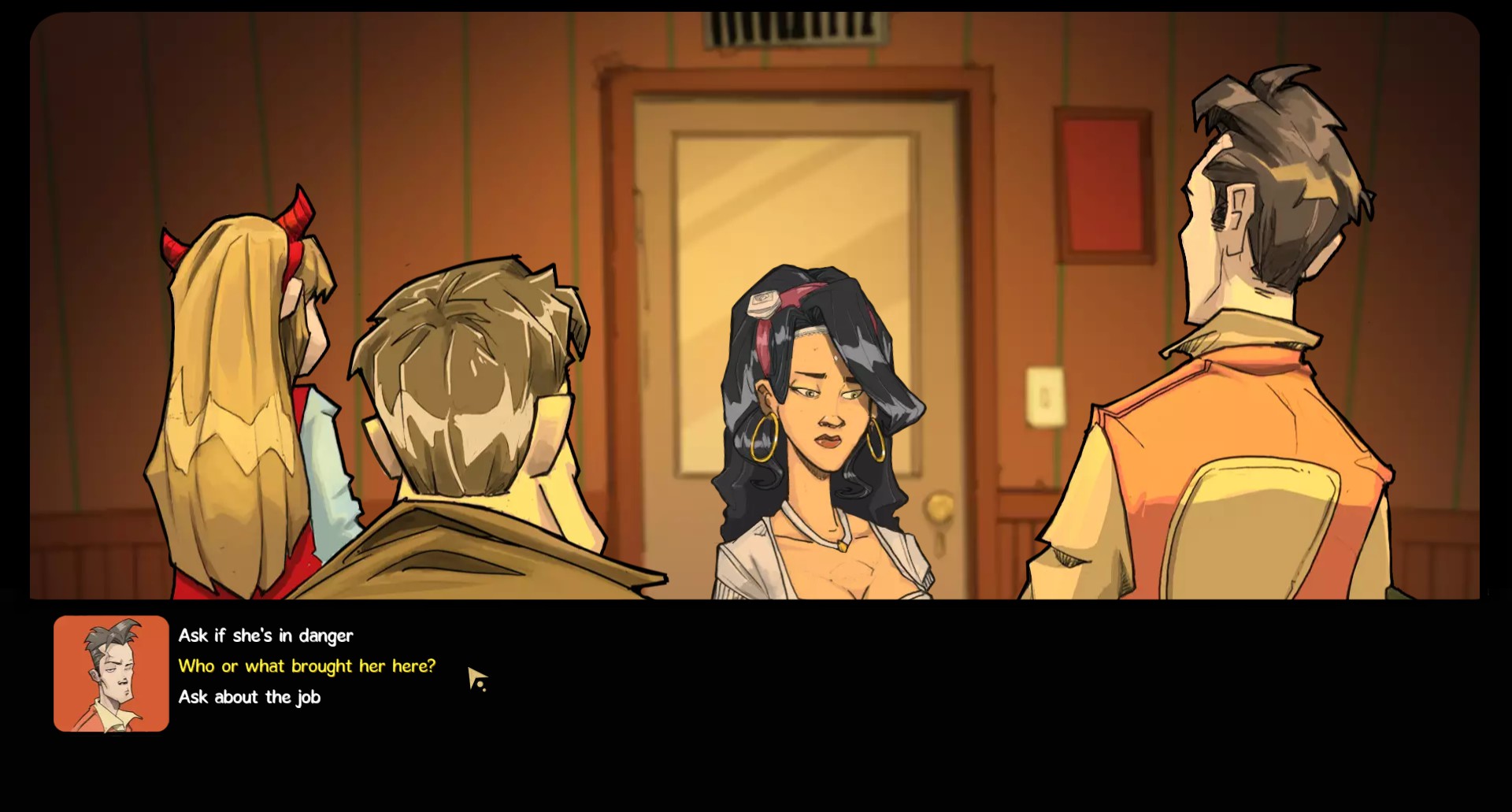
Another aspect that I suspect may be a little jarring for some players is the quality of the English localisation. I feel uncomfortable judging the game on this without experiencing the Spanish or Portuguese versions (one of which I assume is the language that the game's dialogue was originally written in), but I don't speak either of those languages well enough to be able to play the game. The translation of the graphic novels feels stronger, but it's possible that it stands just out more in the game where actors are performing lines that don't quite feel natural. I am definitely be curious to hear how the German localisation (the only other language with recorded voice) compares.
There are a number of interface conveniences that tend to be common which I fond myself missing when playing and re-playing the game. While dialogue lines can be skipped with Space, there is no way to skip cutscenes. There's no double click fast-travel option, which I generally avoid making use of but still find the absence of super irritating.
So far as I've been able to discover, there are no options for configuring the game's resolution, and the game window is not resizeable when set to windowed mode - this may be an important issue for low-res laptop screens. The game also mutes on loss of focus, which caused me to miss sections of voiced dialogue when writing down notes.
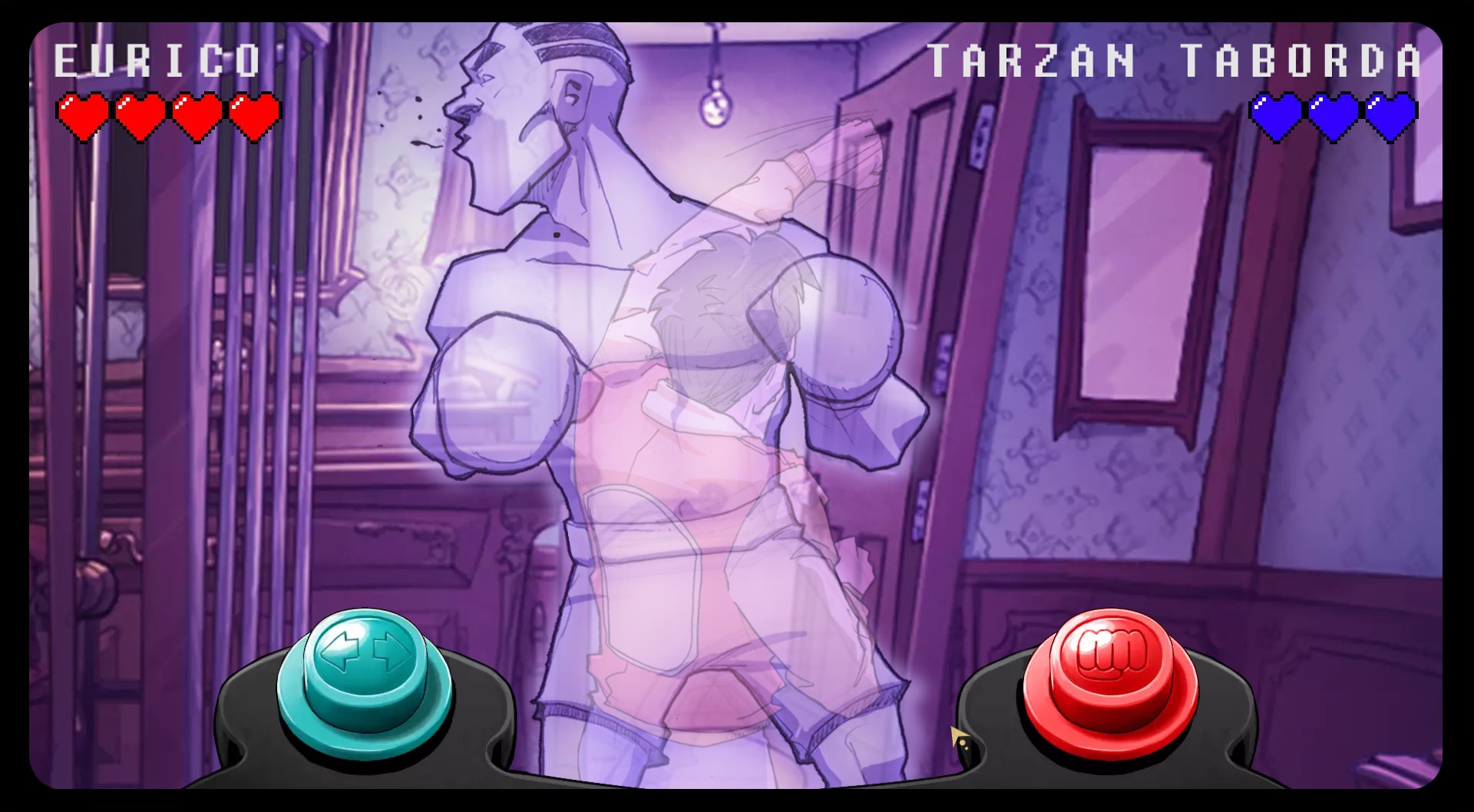
In a move that goes beyond classic point and click adventure gameplay, the Dog Mendonça & Pizzaboy game includes a number of timing oriented fight sequences. While these sorts of arcade-ish elements are certainly not unheard of in the genre and can be used to effectively control tension and provide a counterpoint to core gameplay (fists path combat in Indiana Jones and the Fate of Atlantis springs to mind as a good example), the few point and click adventures which have experimented with them have tended toward making them optional (such as ship-to-ship combat in The Curse of Monkey Island).
Dog Mendonça & Pizzaboy's fight sequences are fairly forgiving and can't imagine them making the game less accessible to very many players. They do provide some nice shifts in tone, but mechanically, they feel a little flat. Unlike the tactical gunplay of Gemini Rue where some slight enemy variations gives opportunity for multiple strategies to feel viable, or Quest for Glory's combat where player stats play a role in effectiveness, mastering Eurico's fighting abilities consists of recognising when to dodge and to immediately follow with a hit.
Though the influences that both the game and graphic novel incarnations of Dog Mendonça & Pizzaboy draw upon are fairly obvious to anybody who has awareness and cares to look, the franchise still manages to carry a solid and endearing identity of its own. To me, The Interactive Adventures of Dog Mendonça & Pizzaboy feels like a respectful homage to 80s and 90s cinema and adventure games. Beyond the celebration of culture that resonates with me, there is an engaging world filled with interesting characters that I can't help but want to spend more time with.
Legacy
Sixteen months after the successful crowdfunding campaign of The Interactive Adventures of Dog Mendonça & Pizzaboy, on the cusp of the game's release, OKAM Studios said goodbye to backers in a heartfelt update. I'm not aware of the circumstances behind the studio's closure, but I can't imagine that it was an easy decision.
The Godot Engine has grown by leaps and bounds alongside Dog Mendonça & Pizzaboy's development. Its recent 2.0 release and Steam launch have been received with enthusiasm by both the existing Godot community and newcomers alike. The engine is now under the protective wing of the Software Freedom Conservancy, which is as I understand it, making sure that two of its primary developers can continue working on it.
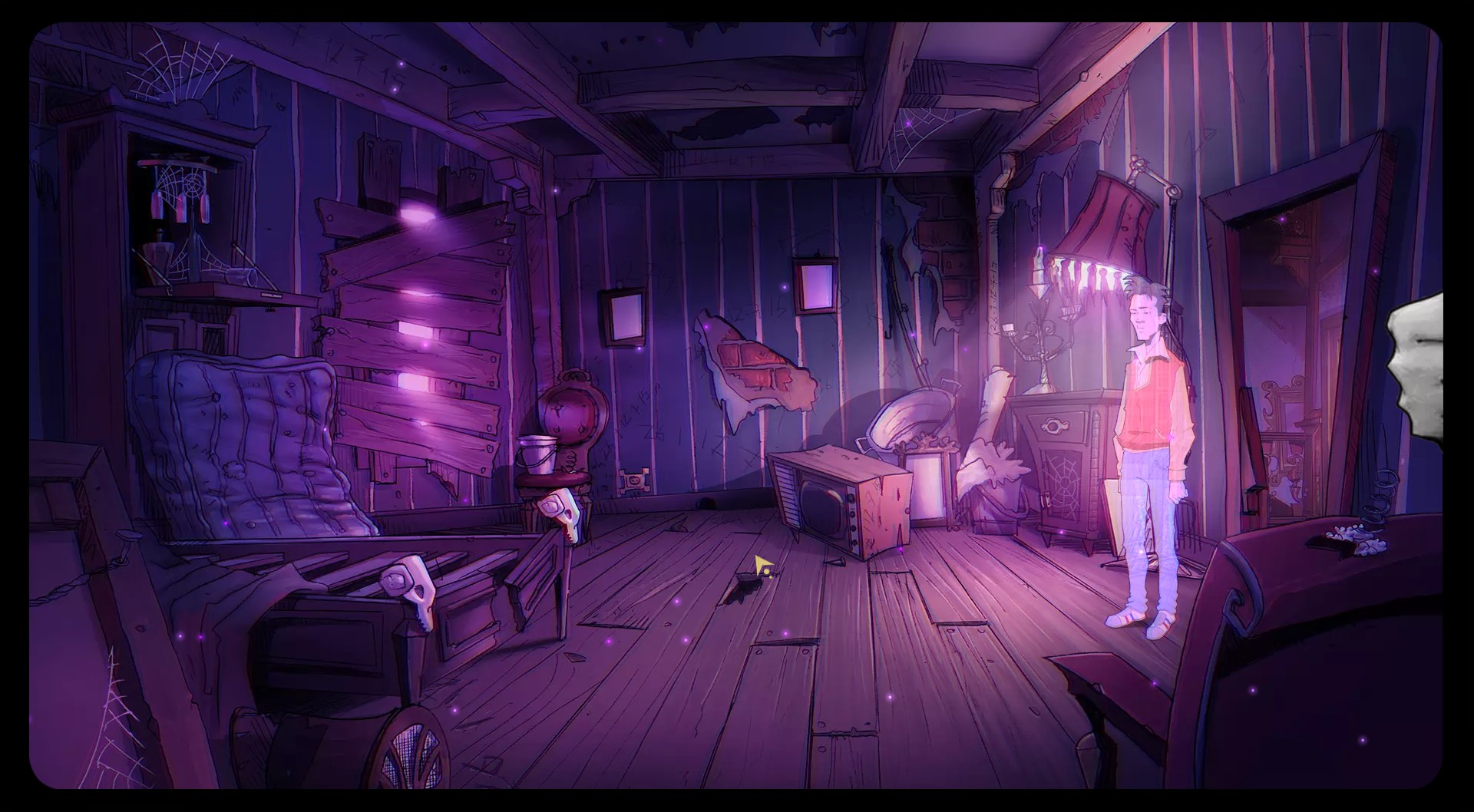
The game itself released on the 4th of March 2016 and is available on Steam, GOG and Humble. So far as I can tell, it seems to have had a positive reception. It's certainly captivated me, and I now consider myself something of a fan.
At this point in time, the possible sequel mentioned in the Kickstarter campaign which would have featured Dog Mendonça as a playable character (poignantly alluded to as Dog finally offers to play a co-op game with Pizzaboy at the game's conclusion) doesn't seem likely, but the world is full of unknown opportunities lurking out of view and who knows what the future may bring.
I wish all of Dog's alumni the best of luck for the future, and hope that the game's audience finds it as enjoyable as I have.
When I first heard about The Interactive Adventures of Dog Mendonça & Pizzaboy, its crowdfunding campaign was already two thirds over and looking like it would have trouble reaching its target. Knowing that it would help OKAM Studio further development of the F/OSS Godot Engine, I hopped onboard, figuring that the game itself would be a bonus and a nice diversion if/when it was released.
Looking back, I find myself doubly glad that I supported this project in spite of the bittersweet ending the journey has had.

YouTube videos require cookies, you must accept their cookies to view. View cookie preferences.
Direct Link
Direct Link
I'd not heard of the franchise before, but I assumed that since it was published by Dark Horse, it was probably some successful thing that I just hadn't crossed paths with. Since my motivations were primarily about supporting the engine's development, I didn't pay attention to the backer updates. When my backer rewards which included copies of the first two Dog Mendonça & Pizzaboy graphic novels arrived earlier this year, I had the opportunity and motivation to become more familiar with Dog Mendonça, Pizzaboy and their creators.
In the early 2000s, armed with little more than a concept and some passion, Filipe Melo broke into the rather limited Portuguese independent film scene with his first (and only) short film I'll See You In My Dreams, which is apparently considered to be the first zombie film of Portuguese origin. Inspired by the film's positive reception and by the creative spirit of other independent filmmakers around the world (something similar to what we see among some independent game developers), Filipe moved on to work on a larger scale project - a script for a film that would be a tribute to the 80s action and horror films that cultivated his love of cinema.

Written in collaboration with Argentinian filmmaker Pablo Parés, this new script took the form of a comedy action horror film that told the story of a disillusioned pizza deliverer who discovers a hidden world of occult monsters after his delivery scooter is stolen by a gargoyle, and becomes caught up in the adventures of a hulking freelance investigator who is responsible for maintaining the Code, a mysterious agreement that protects human society from the monsters and vice versa.
Filipe spent many years of trying to find the right resources and partners to allow such a spectacle The Incredible Adventures of Dog Mendonça & Pizzaboy to be created without compromising the artistic vision behind it, until his girlfriend and producer Paula Diogo suggested that a comic format could be the perfect vehicle for conveying the story without having to be limited by special effects budgets or to relinquish creative freedom to a large studio in order to get it made.
Excited by this idea, Filipe contacted Argentinian art director Juan Cavia, who had been involved with early pre-production efforts, who in spite of advice from friends was happy to return to the project, fulfilling his childhood dreams of working on a comic. After much searching, Santiago Villa was brought on as a colourist to compliment Juan's drawings.

With the help of several other collaborators, The Incredible Adventures of Dog Mendonça & Pizza Boy was published in 2010 through Tinta-de-China, a small publisher based in Lisbon - the same city in which the comic is set. In 2008, Filipe had the opportunity to meet film director John Landis, whose film An American Werewolf in London had been an inspiration Dog Mendonça & Pizza Boy, and invited him to write a forward for the then-incomplete graphic novel. John was impressed by what he saw and passed it on to Mike Richardson at Dark Horse, who would publish an English version in 2011. The comic was met with enough success to spawn a sequel, and a third graphic novel was crowdfunded in late 2013.
Santiago had gone on to co-founded Buenos Aires based game developer OKAM Studio in 2010, and Dog Mendonça & Pizzaboy had apparently had the kind of presence that Sam & Max had at LucasArts before Sam & Max Hit The Road was made, appearing in an internal demo that was used for training and as a testbed for engine development. OKAM had attempted to pitch the game to publishers and investors for years without success, until deciding in 2014 to try crowdfunding as a last resort. After a touch-and-go campaign which was perhaps saved by the public release of the internal demo in the final days, the studio had the funding it needed to make the project financially possible, but not enough to secure the company's future.

Considering all of this, I'm struck by how themes of independence, creative drive and perseverance resonate across the franchise's history. While Dog Mendonça & Pizzaboy have found varying degrees of success, it has been hard earned through passion and dedication, sometimes flying in the face of what might seem commercially sensible, and often not without risk.
While OKAM Studio's doors may be closing, it is survived by a legacy that I imagine most would be proud to have. I hope that the entire team is proud of their work, and that whatever paths the future will lead everyone along, that The Interactive Adventures of Dog Mendonça & Pizzaboy is a project they can look back on with fondness and pride.
Interactive Adventures
In the "making of" segment included at the end of the first graphic novel is a mention that The Secret of Monkey Island and Day of the Tentacle provided Filipe with inspiration for some of the humour seen in the graphic novels. These influences are also present within the game on multiple levels, ranging from superficial similarities to Curse of Monkey Island's cartoon aesthetic to more deeper approaches to puzzle design and pacing that feel in line with sensibilities found in early LucasArts adventures.
The game opens with Eurico (Pizzaboy) and Dog tied up, hanging above a vat of boiling wax during the final act of the adventure, giving some context for the relationship between the two core character while also setting the tone and stakes before skipping backward in time to allow players to control the events that lead up to that predicament.
A fishy new case leads Dog to be captured and Eurico is left to investigate both Dog Mendonça's disappearance and the case on his own with the dubious assistance of Dog's associate Pazuul, a demon trapped in a young girl's body, and the head of a gargoyle named Edgar.

Structurally, The Interactive Adventures of Dog Mendonça & Pizzaboy provides narrative linearity by gating non-linear puzzle chains. Early on in the game, Eurico is tasked with performing a particular rite that requires a certain set of ingredients and tools that the player is free to acquire in any order, but are all required for the story to progress further. As is common with adventure games, the broad strokes of the plot are provided by high level objectives, but the moment-to-moment storytelling emerges in response to the player's actions and attitudes expressed through their dialogue choices and approaches to problem solving.
I found myself enjoying the game's pacing and approaches towards unveiling mystery. Dog Mendonça & Pizzaboy manages to maintain the air of being a fun romp, while making sure that the player's awareness of the overarching plot just beyond reach in a way that keeps things compelling. Though it isn't a long game by the genre's standards (my first playthrough took around 6 hours and I was taking my time), it feels like it comes in at a good length for the story it's telling.
The presentation of the occult world rarely feels gratuitous or pantomime, but I can't help but feel that the game could have benefited from exploring the boundaries between it and the human world a little more. I felt like I was relying more on familiarity with these core concepts of the franchise's universe gained from the novels than from what was exposed within the game itself. I feel that it might be easy for newcomers to assume that the world of Dog Mendonça & Pizzaboy doesn't also encompass the normal everyday human world we know from our own lives. I'm not certain that this would necessarily detract from the game, but to me, it feels like a core aspect of the franchise that gives some extra context to the events of the game.

Another aspect that I suspect may be a little jarring for some players is the quality of the English localisation. I feel uncomfortable judging the game on this without experiencing the Spanish or Portuguese versions (one of which I assume is the language that the game's dialogue was originally written in), but I don't speak either of those languages well enough to be able to play the game. The translation of the graphic novels feels stronger, but it's possible that it stands just out more in the game where actors are performing lines that don't quite feel natural. I am definitely be curious to hear how the German localisation (the only other language with recorded voice) compares.
There are a number of interface conveniences that tend to be common which I fond myself missing when playing and re-playing the game. While dialogue lines can be skipped with Space, there is no way to skip cutscenes. There's no double click fast-travel option, which I generally avoid making use of but still find the absence of super irritating.
So far as I've been able to discover, there are no options for configuring the game's resolution, and the game window is not resizeable when set to windowed mode - this may be an important issue for low-res laptop screens. The game also mutes on loss of focus, which caused me to miss sections of voiced dialogue when writing down notes.

In a move that goes beyond classic point and click adventure gameplay, the Dog Mendonça & Pizzaboy game includes a number of timing oriented fight sequences. While these sorts of arcade-ish elements are certainly not unheard of in the genre and can be used to effectively control tension and provide a counterpoint to core gameplay (fists path combat in Indiana Jones and the Fate of Atlantis springs to mind as a good example), the few point and click adventures which have experimented with them have tended toward making them optional (such as ship-to-ship combat in The Curse of Monkey Island).
Dog Mendonça & Pizzaboy's fight sequences are fairly forgiving and can't imagine them making the game less accessible to very many players. They do provide some nice shifts in tone, but mechanically, they feel a little flat. Unlike the tactical gunplay of Gemini Rue where some slight enemy variations gives opportunity for multiple strategies to feel viable, or Quest for Glory's combat where player stats play a role in effectiveness, mastering Eurico's fighting abilities consists of recognising when to dodge and to immediately follow with a hit.
Though the influences that both the game and graphic novel incarnations of Dog Mendonça & Pizzaboy draw upon are fairly obvious to anybody who has awareness and cares to look, the franchise still manages to carry a solid and endearing identity of its own. To me, The Interactive Adventures of Dog Mendonça & Pizzaboy feels like a respectful homage to 80s and 90s cinema and adventure games. Beyond the celebration of culture that resonates with me, there is an engaging world filled with interesting characters that I can't help but want to spend more time with.
Legacy
Sixteen months after the successful crowdfunding campaign of The Interactive Adventures of Dog Mendonça & Pizzaboy, on the cusp of the game's release, OKAM Studios said goodbye to backers in a heartfelt update. I'm not aware of the circumstances behind the studio's closure, but I can't imagine that it was an easy decision.
The Godot Engine has grown by leaps and bounds alongside Dog Mendonça & Pizzaboy's development. Its recent 2.0 release and Steam launch have been received with enthusiasm by both the existing Godot community and newcomers alike. The engine is now under the protective wing of the Software Freedom Conservancy, which is as I understand it, making sure that two of its primary developers can continue working on it.

The game itself released on the 4th of March 2016 and is available on Steam, GOG and Humble. So far as I can tell, it seems to have had a positive reception. It's certainly captivated me, and I now consider myself something of a fan.
At this point in time, the possible sequel mentioned in the Kickstarter campaign which would have featured Dog Mendonça as a playable character (poignantly alluded to as Dog finally offers to play a co-op game with Pizzaboy at the game's conclusion) doesn't seem likely, but the world is full of unknown opportunities lurking out of view and who knows what the future may bring.
I wish all of Dog's alumni the best of luck for the future, and hope that the game's audience finds it as enjoyable as I have.
Some you may have missed, popular articles from the last month:
All posts need to follow our rules. Please hit the Report Flag icon on any post that breaks the rules or contains illegal / harmful content. Readers can also email us for any issues or concerns.
14 comments
I might just get this for my laptop
0 Likes
Really need to get round to playing this. Tested it out and really liked the first hour and I'm happy to have backed it, not only for the great game but also for contributing to the development of Godot.
1 Likes
I find they polished it quite a lot since the early demo. I am not too far in, but I don't mind the voice acting. I'd rather that than have to read. :P
For people wishing to support Godot development, they now (finally) accept donations (link on the site).
For people wishing to support Godot development, they now (finally) accept donations (link on the site).
0 Likes
Quoting: adolsonI find they polished it quite a lot since the early demo. I am not too far in, but I don't mind the voice acting. I'd rather that than have to read. :PI think the voice acting is pretty good in general, but the English script feels a little off (not enough for me to dislike the game, but enough to notice that English is not the native language of the scriptwriters).
0 Likes
Quoting: CheesenessWhich is okay, because most of us arent english native speakers either :)Quoting: adolsonI find they polished it quite a lot since the early demo. I am not too far in, but I don't mind the voice acting. I'd rather that than have to read. :PI think the voice acting is pretty good in general, but the English script feels a little off (not enough for me to dislike the game, but enough to notice that English is not the native language of the scriptwriters).
Anyway, I bought it as a way to donate to godot engine... I wont have time to actually play it :(
1 Likes
I haven't read the article as I want to be fully surprised when I buy it. The screenshots though remind me, somehow, of Hollywood Monsters a little bit. Which, with all its flaws, I enjoyed very much almost 20 years ago. If puzzles are good and dialogues are witty we could have an amazing graphic adventure :)
0 Likes
The game looks beautiful. Going right to the top of my alarmingly long wishlist.
Quoting: aLDoesn't mean we somehow get more enjoyment out of badly written dialogue. Not in reference to this game in particular, just don't see your point.Quoting: CheesenessI think the voice acting is pretty good in general, but the English script feels a little off (not enough for me to dislike the game, but enough to notice that English is not the native language of the scriptwriters).Which is okay, because most of us arent english native speakers either :)
0 Likes
I'm making my way through the game now, about 5 hours in. About my only complaint is that the voice acting is a kinda wooden. The puzzles have been steadily getting more interesting (nothing too obtuse like old skool Sierra games), the music is great, and the art in the game is flat out amazing. I also like the occasional mini-game they threw in to change things up for a bit.
0 Likes
Quoting: tuubiDoesn't mean we somehow get more enjoyment out of badly written dialogue. Not in reference to this game in particular, just don't see your point.My point is that a hold a c1 in english being close to have c2 now and i barely noticed that the english was off. Just a different wording that I would normally see in an american movie, but no different than when I go to different region where other words are more common.
That being said, I believe cheeseness is australian. His english sounds a little funny to me most of the time as well :)
Last edited by aL on 15 Mar 2016 at 2:31 pm UTC
1 Likes
Quoting: aLI noticed the language thing too. It's not about grammar, since there's no issue with that - more a case of nuance. It's not super jarring, but noticeable. I think we'd need to extract some specific examples.Quoting: tuubiDoesn't mean we somehow get more enjoyment out of badly written dialogue. Not in reference to this game in particular, just don't see your point.My point is that a hold a c1 in english being close to have c2 now and i barely noticed that the english was off. Just a different wording that I would normally see in an american movie, but no different than when I go to different region where other words are more common.
That being said, I believe cheeseness is australian. His english sounds a little funny to me most of the time as well :)
0 Likes
Quoting: rustybroomhandleI noticed the language thing too. It's not about grammar, since there's no issue with that - more a case of nuance. It's not super jarring, but noticeable. I think we'd need to extract some specific examples.They're mostly literal translations from Argentine spanish. Though they're fine grammatically, they just sound a little awkward at times. I really don't think it detracts from the game much as well since its main attribute is the artwork.
0 Likes
Quoting: Segata SanshiroYou sure about that? Although the engine is argentinean, I think the script/original comic/art is Brazilian portuguese. Just saying coz Im an spanish native speaker and didnt notice the literal translation you mention, but maybe it is indeed the case with portuguese :)Quoting: rustybroomhandleI noticed the language thing too. It's not about grammar, since there's no issue with that - more a case of nuance. It's not super jarring, but noticeable. I think we'd need to extract some specific examples.They're mostly literal translations from Argentine spanish. Though they're fine grammatically, they just sound a little awkward at times. I really don't think it detracts from the game much as well since its main attribute is the artwork.
Just my 0.02c as a foreigner... it doesnt feel much weirder that listening to a different variant than american english which is the main english i use i believe. I can understansd it, but British english sounds funny to me too for example
1 Likes
Yeah. All the English in the game is technically correct, it's just some of it is spoken in a way people wouldn't typically say things. A lot of times you can say things in English, and this will vary a bit from English speaking region to region too, several different ways. They are all technically correct and all mean the exact same thing, but only one of the ways is the way people would typically say it.
I'm sure it's the same with other languages. I know for a fact it's that way with Polish. There are several ways you can structure a sentence that are all technically correct and people will understand what you mean, but some of those ways just sound a bit weird because that's not how people typically speak.
Anyway, it's not a big deal and it's perfectly understandable coming from a small studio that comes from a country that doesn't speak English natively. But it's something you definitely pick up on when you're fluent in English.
Last edited by Keyrock on 15 Mar 2016 at 5:24 pm UTC
I'm sure it's the same with other languages. I know for a fact it's that way with Polish. There are several ways you can structure a sentence that are all technically correct and people will understand what you mean, but some of those ways just sound a bit weird because that's not how people typically speak.
Anyway, it's not a big deal and it's perfectly understandable coming from a small studio that comes from a country that doesn't speak English natively. But it's something you definitely pick up on when you're fluent in English.
Last edited by Keyrock on 15 Mar 2016 at 5:24 pm UTC
0 Likes
Quoting: ArehandoroI haven't read the article as I want to be fully surprised when I buy it.That's fair. I do want to highlight that I did my best to keep the article is spoiler free. There are one or two mentions of events from the end, but given that the game takes place between the first and second book, I don't think there's anything that can't already be inferred.
Quoting: alThat being said, I believe cheeseness is australian. His english sounds a little funny to me most of the time as well :)Too right.
Quoting: KeyrockYeah. All the English in the game is technically correct, it's just some of it is spoken in a way people wouldn't typically say things. A lot of times you can say things in English, and this will vary a bit from English speaking region to region too, several different ways. They are all technically correct and all mean the exact same thing, but only one of the ways is the way people would typically say it.I noticed a couple of lines that seemed grammatically unsound. I also feel like there was probably a bunch of dialogue that I haven't seen yet (which is typical for adventure games). I might pull out some examples next time I play.
I'd go so far as to suggest that it impacts on the voice actors' performance (contributing to the "wooden" delivery mentioned earlier). When a line doesn't conform to typical speech patterns, it becomes harder to deliver. Voice actors for games typically don't get an opportunity to rehearse their lines and usually have fairly tight recording windows. Even if there's good direction going on, an awkward script can still have an impact.
Quoting: KeyrockAnyway, it's not a big deal and it's perfectly understandable coming from a small studio that comes from a country that doesn't speak English natively. But it's something you definitely pick up on when you're fluent in English.I still totally maintain that it's not a big issue, but I do believe that even those who haven't noticed it would have found a better experience from dialogue performed from a script with more natural lines.
It's a fairly moot point to discuss since there's no chance of the script being changed or dialogue being re-recorded. I brought it up in the article because I felt that a player might have a better experience if they were aware of it before going in.
0 Likes
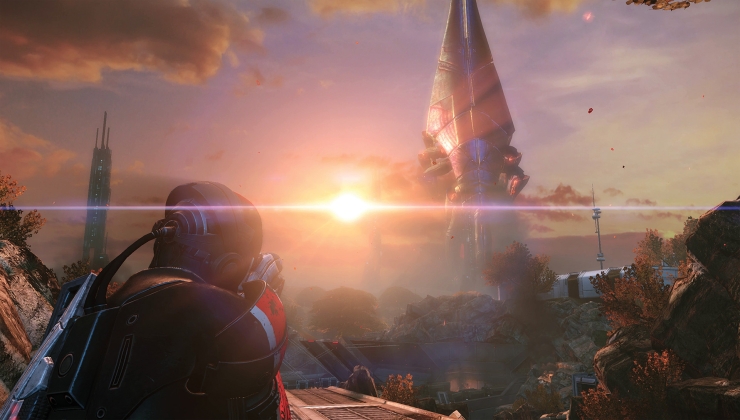
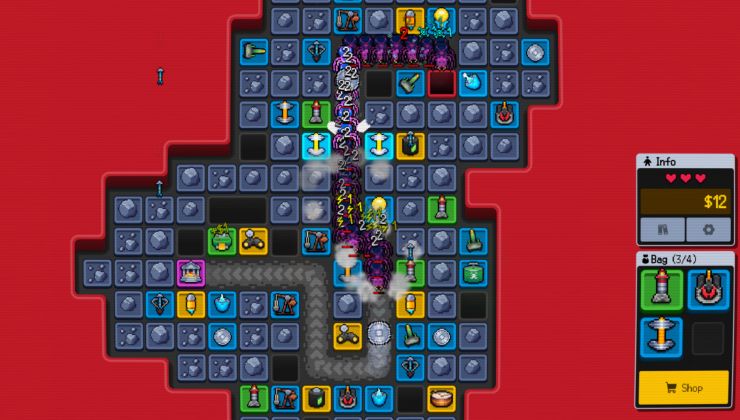
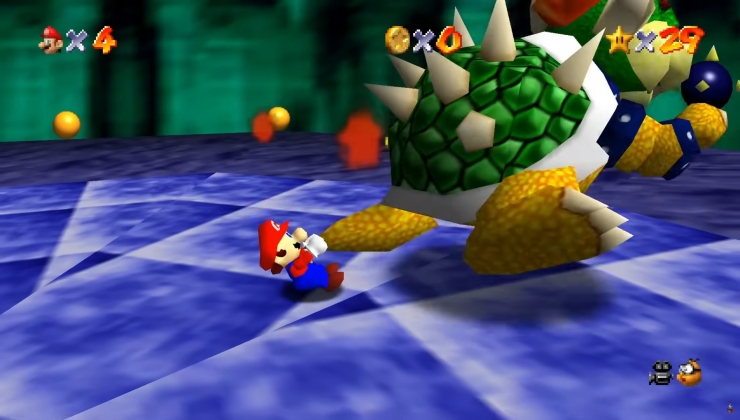






 How to setup OpenMW for modern Morrowind on Linux / SteamOS and Steam Deck
How to setup OpenMW for modern Morrowind on Linux / SteamOS and Steam Deck How to install Hollow Knight: Silksong mods on Linux, SteamOS and Steam Deck
How to install Hollow Knight: Silksong mods on Linux, SteamOS and Steam Deck